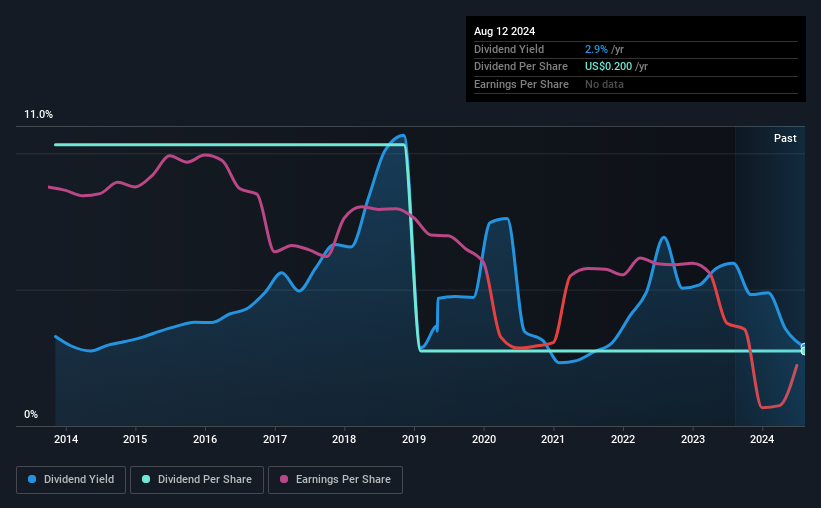Pitney Bowes Inc. (NYSE:PBI) will pay a dividend of $0.05 on the 6th of September. The dividend yield will be 2.9% based on this payment which is still above the industry average.
Check out our latest analysis for Pitney Bowes
Pitney Bowes' Earnings Easily Cover The Distributions
Impressive dividend yields are good, but this doesn't matter much if the payments can't be sustained. Pitney Bowes is not generating a profit, but its free cash flows easily cover the dividend, leaving plenty for reinvestment in the business. We generally think that cash flow is more important than accounting measures of profit, so we are fairly comfortable with the dividend at this level.
The next year is set to see EPS grow by 173.4%. If the dividend continues along recent trends, we estimate the payout ratio will be 16%, which is in the range that makes us comfortable with the sustainability of the dividend.

Dividend Volatility
While the company has been paying a dividend for a long time, it has cut the dividend at least once in the last 10 years. The annual payment during the last 10 years was $0.75 in 2014, and the most recent fiscal year payment was $0.20. The dividend has fallen 73% over that period. A company that decreases its dividend over time generally isn't what we are looking for.
Dividend Growth Potential Is Shaky
Given that dividend payments have been shrinking like a glacier in a warming world, we need to check if there are some bright spots on the horizon. Pitney Bowes' earnings per share has shrunk at 37% a year over the past five years. This steep decline can indicate that the business is going through a tough time, which could constrain its ability to pay a larger dividend each year in the future. However, the next year is actually looking up, with earnings set to rise. We would just wait until it becomes a pattern before getting too excited.
Pitney Bowes' Dividend Doesn't Look Sustainable
In summary, while it's good to see that the dividend hasn't been cut, we are a bit cautious about Pitney Bowes' payments, as there could be some issues with sustaining them into the future. The payments haven't been particularly stable and we don't see huge growth potential, but with the dividend well covered by cash flows it could prove to be reliable over the short term. We don't think Pitney Bowes is a great stock to add to your portfolio if income is your focus.
Companies possessing a stable dividend policy will likely enjoy greater investor interest than those suffering from a more inconsistent approach. Meanwhile, despite the importance of dividend payments, they are not the only factors our readers should know when assessing a company. Just as an example, we've come across 2 warning signs for Pitney Bowes you should be aware of, and 1 of them can't be ignored. If you are a dividend investor, you might also want to look at our curated list of high yield dividend stocks.
New: Manage All Your Stock Portfolios in One Place
We've created the ultimate portfolio companion for stock investors, and it's free.
• Connect an unlimited number of Portfolios and see your total in one currency
• Be alerted to new Warning Signs or Risks via email or mobile
• Track the Fair Value of your stocks
Have feedback on this article? Concerned about the content? Get in touch with us directly. Alternatively, email editorial-team (at) simplywallst.com.
This article by Simply Wall St is general in nature. We provide commentary based on historical data and analyst forecasts only using an unbiased methodology and our articles are not intended to be financial advice. It does not constitute a recommendation to buy or sell any stock, and does not take account of your objectives, or your financial situation. We aim to bring you long-term focused analysis driven by fundamental data. Note that our analysis may not factor in the latest price-sensitive company announcements or qualitative material. Simply Wall St has no position in any stocks mentioned.
About NYSE:PBI
Pitney Bowes
Operates as a technology-driven company that provides SaaS shipping solutions, mailing innovation, and financial services to small businesses, large enterprises, and government entities around the world.
Good value with moderate growth potential.
Similar Companies
Market Insights
Community Narratives


Recently Updated Narratives

Bisalloy Steel Group will shine with a projected profit margin increase of 12.8%

Astor Enerji will surge with a fair value of $140.43 in the next 3 years

Proximus: The State-Backed Backup Plan with 7% Gross Yield and 15% Currency Upside.
Popular Narratives


MicroVision will explode future revenue by 380.37% with a vision towards success


NVDA: Expanding AI Demand Will Drive Major Data Center Investments Through 2026



